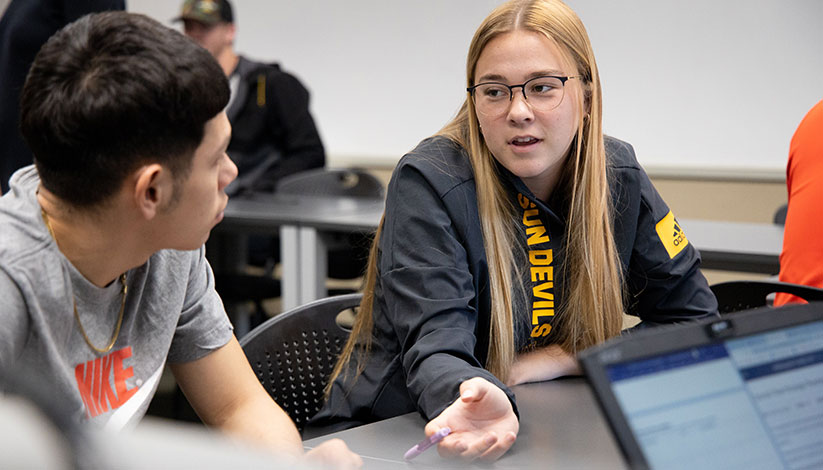Search Sunny
Looking for a topic? Use our search tool to find answers to your questions.

By: Taylor, forensic psychology major
Have you ever wanted to stick up for yourself but couldn’t find the right words? Self-advocacy can be an intimidating thing, and we often discourage ourselves from speaking up even when we know we should.
In college it’s really important to advocate for yourself. You may not have the same support system around that you did in high school or in your hometown, so being able to stand up for yourself and speak up when it’s needed can be really important. I’ve always found talking to my professors to be a good time to stretch my self-advocacy muscle. They’re there to support you, but if you miss a deadline or need help, it’s up to you to reach out and speak up to get the help you need.
Maintain a respectful tone, while staying assertive and remember not to be intimidated (here are a few tips). Faculty are a part of your ASU support team, and they want you to succeed in whatever you choose to do. Start with an introduction if you haven’t formally met and let them know which course you're from so they can try to recall a memory of you in the classroom or on Zoom. Then, let them know why you’re reaching out. If you’re:
Asking for an extension to a due date. If something happened and you missed a due date, it’s worth reaching out to your professor to ask for an extension or help. Continue staying respectful, and let them know you understand their policy (if they have one). Share your reasoning for missing the assignment and accept their decision.
Having trouble with a group project: First, make sure you’ve already reached out to the rest of your group (here are our tips on group project-etiquette) and the individual member and done all you can to try to remedy the situation independently before reaching out to your instructor. If reaching out on your own doesn’t work, it’s time to reach out to your instructor. They know that things don’t always go according to plan, and that assigning group projects is partially an assignment about working with others. If you’re having a real issue with a member of your group, reach out to your professor to let them know. Avoid waiting until the last minute, and
Making a change to your grades: You will need to build a strong case for why your grade should be changed and approach the topic with respect for your professor. That means thoroughly reading the syllabus and the assignment’s rubric to find evidence of where the grading might need adjusting. Showing your professor the specific reason you believe a grade you received was incorrect and politely showing them your reasoning as to why, will help them understand where you’re coming from. Grades can't always be adjusted, but regardless, having this discussion will be a good learning experience in self-advocacy and help your professor get to know you better.
Other extenuating circumstances: For anything else you need to bring to your professor’s attention, from finding support resources to getting assistance understanding a class topic, there are a few things to keep in mind: stay respectful, do your research, read the syllabus and do everything you can to figure out the answer on your own. Professors appreciate when you show you're familiar with all the materials they've provided and that you’ve done your due diligence with provided materials before asking them for help. And make sure to give them enough time to get back to you. That means at least 24 hours if not more.
Remember that you don’t need to focus only on self-advocating when you meet with your professors, you can reach out just to get to know them (here are our tips). In fact, if you’ve already built a relationship with your professor, it will make it much easier to reach out to them for help when and if you do need it!
You can use all of these tips and strategies when self-advocating in other situations too. Let me know your success stories of self-advocating. And if you’d like more support, reach out to your Success Coach.
Looking for a topic? Use our search tool to find answers to your questions.